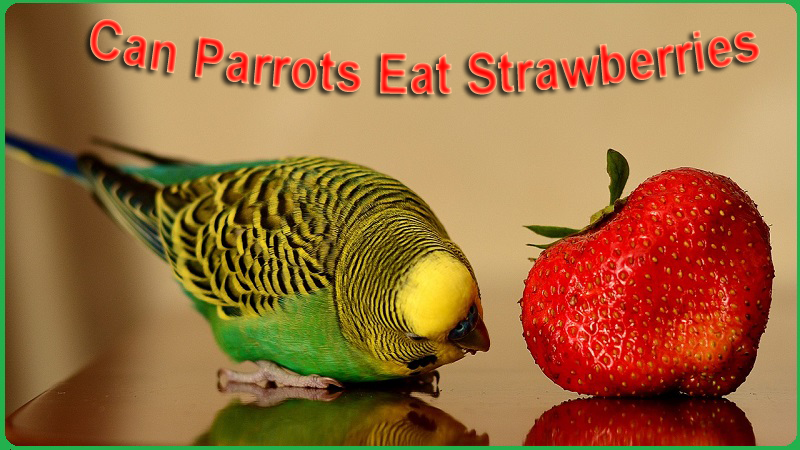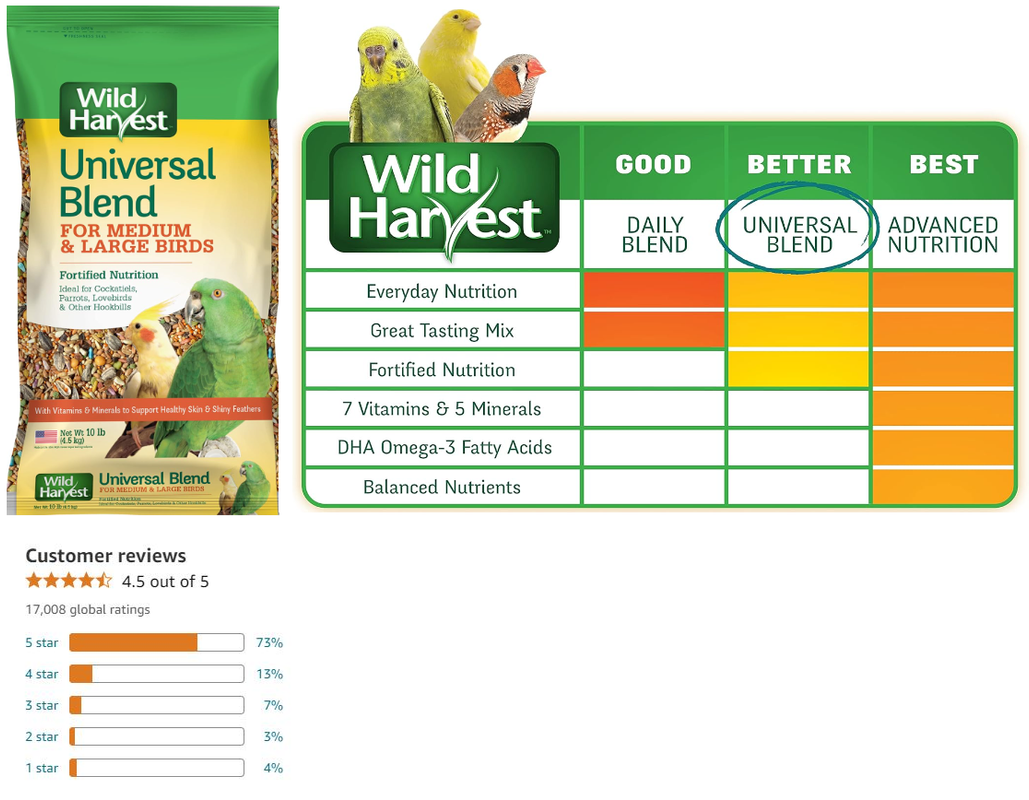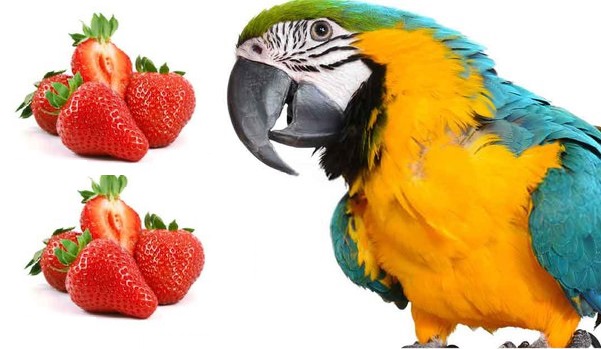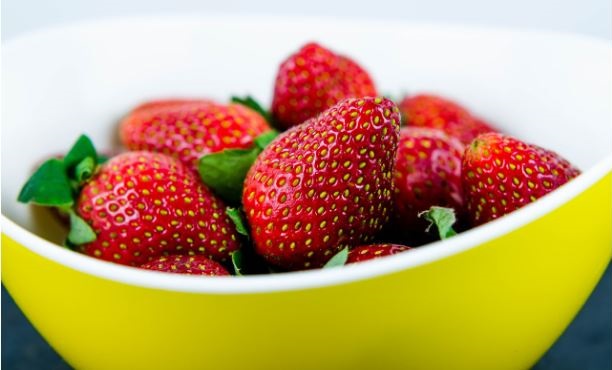Often, most of humans prefer the strawberries, because they get most attraction as juicy looking. Mostly, strawberries are available at every house. If you are parrot’s owner, then you are thinking about ‘can parrots eat strawberries or not’; and it is either safe food or not for parrot.
If you haven’t enough time, then short answer is, yes! You can allow feed strawberries including seeds, flowers, and leaves to your loving parrot, but in moderation. That is why! Then keep reading this article is carefully.

Strawberry is a yummy fruit and most healthy treat for your parrots, because they are enabled with essential vitamins, minerals, and antioxidants. Keeping remember to feed strawberries in moderation due to their high sugar content. Otherwise, they can get upset stomach, if consumed excessively.
Do Parrots Like to Eat Strawberry?
Yes! Parrots generally prefer with enjoying to eat strawberries. They get attracting for sweet taste, bright red colour, and interesting texture of strawberries.
Parrots can also able to eat strawberries whole or chopped up. Strawberry seeds, flowers, and their leaves can be fed to your parrots; because they like them.

Benefits of Strawberries for Parrots
Strawberries are indeed a healthy treat for your parrots, if you feed them in moderation. Here are some benefits, including:
Nutritional Value: Strawberries are packed with beneficial vitamins and minerals that are essential for parrots, including vitamin (C & K), fiber, and antioxidants. These nutrients support to build-up immune system and regulate bodily functions.
Hydration: Strawberries have high water content. So, it can help to keeping your parrot hydrated, especially during warmer months.
Enrichment: Feeding strawberries to parrots can provide mental and physical enrichment. Parrots enjoy the sweet taste and texture of this fruit. So, this can help stimulate their natural foraging behaviors.
Dietary Fiber: Strawberries also enable with fiber content that can aid in digestion and gastrointestinal health.
Major Drawbacks of Strawberries for Parrots
Feeding strawberries too much to parrots can get many serious concerns about their health. Below you can read them:
Also Read: Can Parrots Eat Carrots? (Yes or Not} Feeding Guide
High Sugar Content: Strawberries have the natural sugars. So, this content can contribute to weight gain and other health issues if consumed in excess. Parrots can also develop obesity or diabetes, if they consume too much sugar regularly.
Acidity: Some parrots can get upset the gastrointestinal, due to strawberry’s acidity, especially if they have sensitive stomachs. So, you can see many symptoms like diarrhea or vomiting.
Allergic Reactions: Some parrots may be getting allergic to eat strawberries or certain compounds found in them. Allergic reactions can manifest as itching, swelling, or difficulty breathing.
Pesticide Residues: If strawberries are not properly washed, they may contain pesticide residues that can be harmful to parrots if ingested. Always wash strawberries thoroughly before offering them to your parrot. Otherwise, you should buy organic strawberries to minimize pesticide exposure.
Choking Hazard: The seeds of strawberries can pose a choking hazard, especially for smaller parrot species, those are unable to chewing it properly. So, you should always cut strawberries into small and manageable pieces before giving them.
Can Parrots Eat Strawberry Seed, Leaves, and Flower?
Yes! Parrots can eat all parts of the strawberry plant, including the seeds, leaves, and flowers.
Also Read: Can Parrots Eat Tomatoes? Complete Feeding Guide
Strawberry seeds are enabled with fiber and nutrients that are beneficial for parrots.
The leaves are safe for parrots. But some birds may find them bitter, and like the fruit flesh. It is important to inspect the leaves for any signs of bacterial before feeding them to parrots.
Strawberry flowers can be also considering the safe for parrots to consume, if provided they are free from pesticides.
Overall, all parts of the strawberry plant are considered safe for parrots to eat, but in moderation.
Nutritional Facts of Strawberries for Parrots
Here, we will show you some key nutritional facts about strawberries, and how they can benefit parrots:
| Nutrient | Amount Per 100g |
|---|---|
| Calories | 32 kcal |
| Protein | 0.7 g |
| Carbohydrates | 7.7 g |
| Dietary Fiber | 2 g |
| Sugars | 4.9 g |
| Fat | 0.3 g |
| Vitamins | |
| Vitamin C | 58.8 mg |
| Vitamin K | 2.2 mcg |
| Minerals | |
| Potassium | 153 mg |
| Manganese | 0.386 mg |
| Water | 90.95 g |
Vitamins: Strawberries are rich in essential vitamins, including:
- Vitamin C: Important for the immune system, wound healing, and overall health.
- Vitamin K: Supports blood clotting and bone health.
Minerals: Strawberries contain various minerals, such as:
- Potassium: Essential for proper nerve and muscle function.
- Manganese: Contributes to bone health and metabolism.
Antioxidants: Strawberries are packed with antioxidants, including:
- Anthocyanins: Help protect cells from damage and reduce inflammation.
- Ellagic Acid: May have anti-inflammatory and anti-cancer properties.
Hydration: With their high water content, strawberries can contribute to keeping parrots hydrated, especially during warmer weather.
Dietary Fiber: The fiber in strawberries promotes digestive health by preventing constipation, and supporting a healthy gut micro biome.
Low in Fat and Calories: Strawberries are low in fat and calories, making them a suitable snack option for parrots when given in moderation.
Do Parrots Eat Strawberries in the Wild?
Parrots don’t commonly eat strawberries in the wild. Wild parrots mostly like to eat native berries rather than strawberries. While strawberries can be a safe and nutritious treat for domesticated parrots, but they are not a natural part of a parrot’s wild diet.
Introduce of strawberries to a parrot’s diet is more of a human practice. Parrots in the wild typically consume a diet based on fruits and berries native to their natural habitats.
Parts and Types of Strawberry Plant
A strawberry plant consists of several major parts:
Also Read: Can Parrots Eat Watermelon (Seed + Rind)? Feeding Guide
Roots: Generally, you can see strawberry plant in your garden or wild. Strawberry plant has the root system as other plants. Its root is fibrous, with multiple roots that spread out from the crown. These roots are typically shallow, with most of them contained in the top 6 inches (15 cm) of soil.
Crown: The crown is the main base of the plant, where the leaves and roots meet. It is a short stem from which leaves develop at points called nodes or auxiliary buds. New leaves grow up with a bud in the axil of each leaf. These auxiliary buds can remain undeveloped, grow and form runners, or grow to form a side or branch crown.
Leaves: Strawberry leaves are merged, typically with three leaflets, saw tooth-edged, and usually hairy.
Flowers: Strawberry flowers are borne in small clusters on slender stalks arising from the axils of the leaves. They are generally white, rarely reddish, so they are considered an important part of the plant’s reproductive cycle.
Runners: Strawberry plants produce runners that are long stems that grow from the crown and produce new plants at their tips. The spaced plants can remove these runners or allowed to form a matted row alongside the original parent plants.
Strawberry plants can be categorized into three main kinds based on their growth habits and fruiting patterns:
June-Bearing Strawberries: These plants produce a single crop in the spring and flower production ceases as temperatures increase. They are most suited to the Coastal and Central regions of South Carolina.
Everbearing Strawberries: These plants produce fruit twice a year, with some varieties producing fruit continuously throughout the growing season.
Day-Neutral Strawberries: These plants are also known as woodland strawberries and can produce fruit throughout the growing season, regardless of day length.
Can Parrots Have Strawberry Juice?
Yes! Parrots can have strawberry juice. But, it should be provided with caution and moderation. Strawberry juice can encourage parrots to get hydrated, especially if they are reluctant to drink plain water.
However, you should not feed strawberry juice or other strawberry-flavored products to parrots. They contain dairy or added sugars, as these can be problematic for parrot’s health. Homemade, diluted strawberry juice can be a safe and beneficial to parrots.
Overall, your pet parrots can have strawberry juice. But, it should be provided in moderation and without any additional ingredients, or it could be harmful to them.
Can Parrots Eat Dried Strawberries?
You can feed dried strawberries to your parrot. Dried strawberries enable with higher fiber and antioxidant as compared to when they are fresh. You can allow dried strawberries to your feathered pal as a snack or occasional treats in her diet.
But, you should not entirely replace of the dried strawberries into fresh strawberries in your parrot’s diet.
How Many Strawberries Can I Give My Parrot?
As per our advisor, you have to regulate the number of strawberries you offer to your parrot. so you can give strawberries a few times a week in addition to other fruits and vegetables. Since strawberries pack with sugar content, so you monitor the amount given to prevent any major health issues for your parrot.
Allow to limit strawberries to 1-2 servings per week, with each serving having a few strawberries. Moderation is key factor when feeding strawberries to ensure they are a healthy and enjoyable treat for your parrot.
How Do You Feed Strawberries to Parrots?
You should consider some key points on how to properly feed strawberries to your parrots:
- Thoroughly wash strawberries to remove pesticides, or prefer using organic strawberries
- Chop or slice strawberries into smaller pieces to consume with ease
- You have to limit servings to 1-2 times per week, with each serving being just a few strawberries
- Keep preventing to process strawberry products with added sugars or preservatives
- Serve strawberries right before cage cleaning to minimize mess
- Remove any uneaten strawberry pieces promptly to prevent spoilage and bacterial growth
Best Alternatives of Strawberries
Here are some suitable alternatives to strawberries for parrots that provide similar nutritional benefits, including:
- Guava
- Papaya
- Passion fruit
- Fig
- Pomegranate
- Watermelon
- Cantaloupe
- Currants
- Apple
- Pear
- Huckleberries
Summing Up
As the resulting of this article, strawberries can be an excellent source of nutrients and antioxidants. So, they help to keep well-being parrot’s health. The complete strawberry plant is safe stuff for your parrot, like as seeds, leaves, and their flowers.
If this article is useful for you, then please share it along with your friends, family members, parrot lovers or relatives over social media platforms like as Facebook, Instagram, Linked In, Twitter, and more.
Do you have any experience, tips, tricks, or query regarding on this? You can drop a comment!
Have a Nice Day!!





